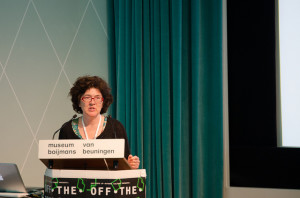
Elizabeth Castro kicked off the second session of the conference by introducing herself as a computer book writer. She is the author of several guides on how to create webpages and epubs by working with tools like HTML, XML, InDesign and CSS.
In this talk, however, Castro showed how she applies this know-how to a topic close to her heart: the independence of Catalonia. She is an active contributor to Catalan online news portal VilaWeb and has recently moved to Barcelona. When she first started the collaboration there, she noticed how hard it was to spread the word about Catalonia’s struggles internationally. The reason was the use of one language (Catalan) and only posting news on the website. That is when she decided to carry interviews with Catalan activists, researchers, politicians, writers and artists on Twitter, in multiple languages, using the social network as a live chat. After this, she came up with the idea of publishing the interviews as electronic collections.
The interviews take place in real time, Castro explained, and people can follow and comment on them, therefore creating a new space for discussions. Each interview has the hashtag #CatalanTalk and another one for the local language (for example, #CatalanTalkEn). Each interview is translated in multiple languages by a team of volunteers. The interviews are further embedded on the Twitter stream on VilaWeb’s website.
There are challenges to this method, Castro also pointed out. First, she needs to decide the exact time to have the interview each week, so that followers know when it takes place. This is particularly burdened by the different times zones of interviewees. Another challenge is that both her and the interviewee need to type extremely fast – the interviews last maximum one hour, because that is how long they expect followers to tap in.
The main benefit of this method is the global reach of her interviews, facilitated by the use of hash tags, comments, re-tweets and translations.
There are also limitations to Twitter interviews, she warned. For example, interviewees need to have an account and to be familiar with Twitter in the first place. Furthermore, they might often get very heated on the topic, which makes the interview hard to moderate. Finally, not everyone can follow the interviews on Twitter (either because they do not have an account or simply because they read on other formats). While Castro regularly publishes the interviews on VilaWeb, she recently decided to turn them into e-publications too.
How does she do that? The flow of publishing starts with archiving all the tweets via Storify. Then, Castro explained, she exports them from Storify to XML. At this point, there might be a lot of irrelevant tweets in the data. In order to extract the clean interview, she uses XSLT to filter the XML file by giving it certain commands (such as to delete all re-tweets or comments and keep only the original interview). After clearing it up, she imports the XML file in InDesign, where the text loses all the unnecessary metadata and becomes readable text. Finally, she proof reads and copy-edits the text, as typos and grammar mistakes are common when writing so fast. She also sometimes edits abbreviations and typos (these are inevitably used on Twitter, given the 140 characters limit) but restrains from changing her interviewees’ writing styles or tone of voice. After all these steps, she exports the file to EPub, which can also be printed and distributed.
Reflecting on the idea of having liveTwitter interviews and then transforming them into e-publications, Castro believes one can truly take advantage of the ephemeral, but highly interactive and engaging nature of Twitter conversations and transform them into concrete literature by means of e-publishing.
You can find a PDF of her original presentation here: Presentation Elizabeth Castro
Photo credits: Martin Risseeuw


